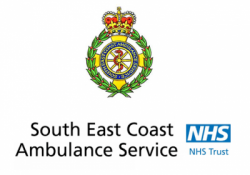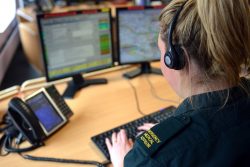 Abraham Lincoln
If given the truth, the people can be depended upon to meet any national crisis...
Abraham Lincoln
If given the truth, the people can be depended upon to meet any national crisis...
 Guildford news...
for Guildford people, brought to you by Guildford reporters - Guildford's own news service
Guildford news...
for Guildford people, brought to you by Guildford reporters - Guildford's own news service
Paramedic Students Have ‘Unique Vulnerability’ to Sexual Misconduct
Published on: 15 Apr, 2024
Updated on: 16 Apr, 2024
local democracy reporter
An NHS ambulance trust has flagged that its student paramedics have a “unique vulnerability” in experiencing sexual misconduct.
Paramedic students on placement from university were not always confident to “speak up” and had expectations of professional behaviour, a South East Coast Ambulance (SECAmb) board meeting heard on April 4.
The NHS Sexual Safety Charter was created after hundreds of female doctors and nurses exposed a culture of misogyny and sexual harassment. Launched in September 2023, the charter was adopted by the SECAmb Board in December 2023 with the aim to meet compliance by July 2024.
Including 10 pledges, the Charter commits to working to eradicate sexual harassment and abuse in the workplace, recognise intersectionality, promote transparency, provide support and communicate standards of behaviour.
Leading the work for the charter is Margaret Dalziel, executive director for Quality and Nursing. She said: “We know from many examples the student cohort is a quiet cohort that suffers as it comes into the whole ambulance sector, not just SECAmb.”
A student paramedic working within SECAmb said she was left “shocked and violated” after her male colleague touched her inappropriately on multiple occasions, as reported in an exclusive by The Independent. The male colleague was suspended in 2022 and struck off in 2023 following another allegation of sexually inappropriate behaviour.
Updating the board, Margaret said there is now an “incredibly low tolerance to any level of banter or harassment we know of”, increasing suspensions related to different sexualised behaviour. She said this included “smacking someone’s bottom as they walked past” and terms like “sex for sign-offs”- students being pressured into sexual acts in exchange for passing assignments.
Around 650 student paramedics on placement at SECamb will receive training on sexual safety and “speaking up” during their induction. The Trust Board was also assured there is a “strong and robust” safeguarding team and a 24/7 on-call facility.
The news follows the NHS report in February on a culture of sexual assault and misogyny in NHS ambulance services. However, the SECAmb sexual charter working group decided not to take its own survey of staff experience with sexual safety. Meeting documents read: “The assumption has been made that SECAmb will be facing the same level of poor behaviours as experienced in all the other Ambulance Trusts.”
Although the service pointed towards induction workshops and management training, it did not have a sexual harassment and abuse policy or specific sexual safety training for all staff. Meeting documents highlighted not all staff understood the seriousness of the issue, with some colleagues responding to sexual harassment as “banter”, or would not know how to spot or respond to it.
“Resetting the moral compass as to what is acceptable and what isn’t” was said to be the major cultural challenge to the service. Although “zero tolerance” is defined in the policy as any unwanted behaviour will result in sanctions, Margaret said the workforce needs to see it consistently applied to set the standard. The board heard how suspension numbers have doubled in the last six weeks.
Under-reporting was still seen as an issue because of a lack of diversity and anonymous data. Current training and resources did not address that sexual misconduct could impact same sex, and female on male abuse, which Margaret admitted the service was “blind to”.
The SECAmb report admitted it did not “fully understand the experience of certain groups in speaking up” including students, new starters, international paramedics, disabled colleagues, BAME, LGBTQ+.
The CEO of SECAmb Trust, Simon Weldon, said: “This is something that has been endemic in all emergency services for a long time. The ambulance sector is the latest service to receive a report – before that, there has been the police and the fire service.”
He highlighted other instances where people are cooped up together in small spaces for quite long periods. Simon added the issues are “transcultural” and speak to the context of two people working together in a cab for 12 hours a day.
The report admitted sexual misconduct was a “high risk” as a “culture of sexual conduct” leads to whistleblowing cases, negatively affecting staff turnover and can impact patient and staff safety.
Recent Articles
- Guildford Institute’s Crowdfunding Project for Accessible Toilet in its New Community and Wellbeing Centre
- Letter: Guildford – Another Opportunity Missed?
- Letter: GBC’s Corporate Strategy – Where Is the Ambition?
- My Memories of John Mayall at a Ground-breaking Gig in Guildford Nearly Six Decades Ago
- Westborough HMO Plans ‘Losing the Heart of the Street’ Says Resident
- College Invests to Boost Surrey’s Economy and Close Digital Skills Gap
- Community Lottery Brings Big Wins for Local Charities
- GBC Housing Plan Promises ‘A Vibrant Urban Neighbourhood’ Near Town Centre
- Hospital Pillows ‘Shortage’ at the Royal Surrey
- Updated: Caravans Set Up Camp at Ash Manor School


Search in Site
Media Gallery
Dragon Interview: Local Artist Leaves Her Mark At One of England’s Most Historic Buildings
January 21, 2023 / No Comment / Read MoreDragon Interview: Lib Dem Planning Chair: ‘Current Policy Doesn’t Work for Local People’
January 19, 2023 / No Comment / Read MoreA3 Tunnel in Guildford ‘Necessary’ for New Homes, Says Guildford’s MP
January 10, 2023 / No Comment / Read More‘Madness’ for London Road Scheme to Go Ahead Against ‘Huge Opposition’, Says SCC Leader
January 6, 2023 / No Comment / Read MoreCouncillor’s Son Starts Campaign for More Consultation on North Street Plan
December 30, 2022 / No Comment / Read MoreCounty Council Climbs Down Over London Road Works – Further ‘Engagement’ Period Announced
December 14, 2022 / No Comment / Read MoreDragon Interview: GBC Reaction to the Government’s Expected Decision to Relax Housing Targets
December 7, 2022 / No Comment / Read MoreHow Can Our Town Centre Businesses Recover? Watch the Shop Front Debate
May 18, 2020 / No Comment / Read More












Recent Comments